The 74 (Neag School’s Sarah Woulfin is quoted about lower class sizes)
Professional Learning Communities for State’s Science Educators
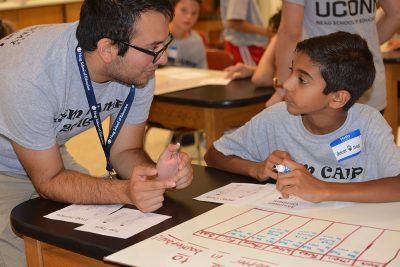
Editor’s Note: The following was originally published on the UConn Innovation Portal.
Two University of Connecticut professors have received funding from the Connecticut State Department of Education, the U.S. Department of Education’s Office of Elementary and Secondary Education, and Central Connecticut State University to create a network to develop training for science and preservice educators.
In collaboration with their partners, Todd Campbell, professor of science education and David Moss, associate professor and director of global education for the Neag School, have established the Connecticut Network for Science Educators and Preservice Teachers (CoNSEPT). This network brings together all members of the science education community responsible for training preservice science teachers to discuss and create common activities as part of professional learning communities.
CoNSEPT brings together all members of the science education community responsible for training preservice science teachers to discuss and create common activities as part of professional learning communities.
These discussions and activities will be guided by the reform initiatives established by the Framework for K-12 Science Education and Connecticut’s Next Generation Science Standards (NGSS). The NGSS are designed to ensure students understand core concepts and participate in and comprehend the value of the collaborative elements of scientific research and practices.
The initial training for the CoNSEPT program will be completed on an online platform called Next Generation Science Exemplar (NGSX), which will be complemented by an in-person engineering learning opportunity, ORTIS.
ORTIS is a professional development platform that allows teams of science teachers to focus on integrating engineering practices into other sciences using an engineering design process (EDP) to guide project-based learning activities that could be incorporated into the K-12 Science Framework.
Engineering practices are one of the core pillars of NGSS standards as they provide students with a clearer understanding of the idea of scientific “inquiry” and the range of skills and diversity of thought it requires. These practices require students to ask questions, define problems, develop and use models, analyze and interpret data, use mathematical thinking, and communicate findings.
The second phase of the project will go on to ensure that all preservice science teachers are equipped with the tools necessary to teach science to K-12 students in the 21st century.
Campbell’s areas of expertise include science education, secondary education, formal and informal science learning, and teacher education and professional development. Campbell received his Ph.D. in curriculum and instruction-science education from the University of Iowa in 2004.
Moss specializes in global and international education, study abroad program design, environmental education, curriculum studies, and teacher education. He received his Ph.D. in education from the University of New Hampshire.
Access the original post on the UConn Innovation portal.
Sushruta Kunnenkeri ’18 MA: Finding His Path to Teaching
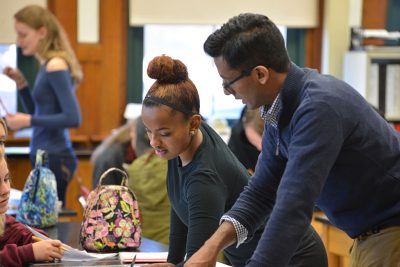
Career paths are not always obvious or direct. Sometimes it takes some encouragement from a family member or a supportive teacher, and maybe a pinch of self-belief for an individual to choose a path. Sometimes it takes an accumulation of outside support, a nudge in the right direction. Sometimes career paths take unexpected turns.
For current Neag School of Education student Sushruta Kunnenkeri, 31, who is enrolled in the Teacher Certification Program for College Graduates (TCPCG) based at UConn’s Avery Point campus in Groton, Conn., it took allowing a seed his father planted to blossom.
For Kunnenkeri, education and science have always been part of his life, which even reflects his first name, Sushruta, the ancient Sanskrit name of a celebrated fifth-century physician in India known as “the father of surgery.”
“My father gave me and my siblings all ancient Sanskrit names. He named me Sushruta, planting the seed of understanding science at an early age,” says Kunnenkeri. “I’m proud of my name now, but my dad would always bring it up during doctor’s appointments.”
Building Confidence
When Kunnenkeri was a child, his father fostered a learning environment at the kitchen table, inviting his children to talk about science and history, giving them the confidence to explore new fields and ask questions — something Kunnenkeri, now an aspiring science teacher, wants to encourage his students to do.
“If I can help build students’ confidence and coach them in the right direction, building their level of understanding … about science, it might change their lives,” says Kunnenkeri, whose professional experience prior to joining TCPCG includes having served as a mental health counselor at such institutions as Tufts Medical Center, where he co-taught and led clinical education classes for patients. Prior to working at Tufts, Kunnenkeri worked as a clinical research assistant at the Immune Disease Institute at Harvard Medical School in the Alper lab, where he co-authored a research paper.
“If I can help build students’ confidence and coach them in the right direction, building their level of understanding … about science, it might change their lives.”
— Sushruta Kunnenkeri ’18 MA
In addition to his father instilling appreciation for science at a young age, Kunnenkeri says his role model and brother-in-law, Cecil J. Thomas, taught him the importance of giving back to the community — a lesson that especially resonated with Kunnenkeri during the year following graduation from Northeastern University, when he spent two months volunteering in a legal aid office in the Hartford, Conn., area. His experience there, he says, allowed him to witness how poverty can inhibit opportunities for people. And it also proved crucial in giving him a sense of direction after the death of his father, which had occurred a few years earlier, just as Kunnenkeri was to start his sophomore year.
“I was on the verge of not completing my college degree … because I developed a sense of apathy,” Kunnenkeri says. “I kept working, but academics was not a priority after my dad passed away. I had a difficult time seeing the bigger picture in life. My family got me focused again and enthusiastic about my education. My brother-in-law inspired me to be the best version of myself and showed how our personal passions and life’s work can make a difference if we listen to the needs of others, work hard, and put others before ourselves.”
Eventually graduating in 2011 with a bachelor’s degree in biology and minor in philosophy from Northeastern, Kunnenkeri went on to enter a University of California Berkeley program in advanced biosciences. It was around this time that he came back to that lesson of giving back to the community and began serving as a health educator and mental health counselor, teaching patients how to lead healthier lives and advocate for themselves.
“I was … teaching with patients, and it kind of completed a lot of things that I was feeling when I was growing up. I was always taught to help people,” says Kunnenkeri. “I realized more and more my passion was in teaching children science, more than anything else, after working with disadvantaged kids and young adults in mental health. I saw the disadvantages some patients had educationally, and I wanted to help deliver more equitable education to leverage opportunities for young adults.”
Firsthand Experience in the Classroom
Kunnenkeri learned of the Teacher Certification Program for College Graduates at the Neag School and realized it offered an opportunity to make an impact on the lives of young people on a broader scale.
TCPCG is an 11-month certification program that trains aspiring teachers in the foundations of education theory and gives them the classroom experience necessary to execute those theories, according to John Settlage, Neag School professor and Kunnenkeri’s advisor. Through TCPCG, students earn a master’s degree and certification to teach in the state of Connecticut. TCPCG operates out of three UConn campuses: Avery Point, Hartford, and Waterbury.
This academic year, there are 16 students in the program based at Avery Point, ranging in age from 22 to 60 years old. Many of them are, like Kunnenkeri, career changers. TCPCG was established in 2004 at UConn’s former West Hartford campus and was expanded to the Avery Point campus in 2013. Since then, 100 percent of TCPCG graduates from the Avery Point location have been hired in STEM fields, says Settlage; only one student from the past five years is no longer teaching, having enrolled in a doctoral program at the Neag School.
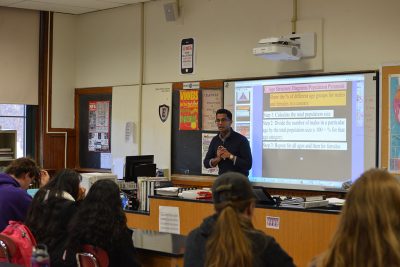
Kunnenkeri is also a recipient of the Robert Noyce Teacher Scholarship, which awards $30,000 to individuals with STEM expertise who are interested in teaching in STEM programs in K-12 schools. The scholarship provides this full tuition assistance, along with a $1,000 grant for the purchase of equipment and supplies. Following completion of TCPCG, Noyce Scholarship recipients must go on to teach for two years at a school that has high teacher turnover rates or that is defined as high-needs, meaning more than 40 percent of its students receive free or discounted lunches.
Kunnenkeri is from Boston, and it is unique he received the scholarship for a Connecticut school. Initially, Kunnenkeri applied to the University of Massachusetts Amherst’s teaching certification program, a two-year program. However, because UConn’s program is accelerated, the New England Board of Higher Education reduced the $60,000 out-of-state tuition to $30,000, which the scholarship covers.
As a Noyce Scholar, Kunnenkeri conducted research over the summer on clams and oysters, known as bivalves, to help develop a curriculum to teach high school science classes. His research focused on how bivalves demonstrate the link between ocean ecology and human health.
All Noyce scholars assist with a marine science-related research project, which they can use in turn to influence outcomes of students in the classroom, says Settlage, who leads TCPCG at the Avery Point campus.
These experiences, Settlage says, prepared Kunnenkeri for the time he spent this past fall as a student teacher at Norwich Free Academy, under high school science teacher Jason Croteau.
“[Croteau] allowed me the space to make mistakes and tell me what I did wrong and what we can do to make it better,” says Kunnenkeri. A central focus was learning how to solicit and receive feedback.
“This was crucial to my becoming a better student teacher, as I was able to reflect and gain feedback,” Kunnenkeri adds. “It was a humbling experience to work with Jason, who even after all his years teaching continued to model for me how he always reflects and listens to students in his teaching practice and was always open to my own ideas.”
One of the biggest lessons the program teaches students, Settlage says, is how to provide equitable conditions for all students and to engage students in learning. “I think our focus on trying to think about how to teach every single kid in a classroom, and going into more diverse school settings, is a pretty clear message in the program,” he says.
“Teachers are positioned to provide a positive influence and source of confidence to students and can provide that scaffolding for them to learn science, but also to think critically,” says Kunnenkeri, who is on track to complete the program this spring. “I believe the Neag School and TCPCG specifically does this so well by showing us how to be socially conscious teachers and leveraging what STEM education can actually do for all students, especially those who are disadvantaged.”
Considering a career change? Learn more about the Neag School’s Teacher Certification Program for College Graduates (TCPCG) at s.uconn.edu/teach.
Neag School Accolades – January 2018
Congratulations to our Neag School alumni, faculty, staff, and students on their continued accomplishments inside and outside the classroom. If you have an accolade to share, we want to hear from you! Please send any news items and story ideas to neag-communications@uconn.edu.
In addition to the Dean’s Office and Department achievements, explore this edition’s list of Accolades for the following: Faculty/Staff; Alumni; Students, as well as In Memoriam.
Dean’s Office and Departments
The Neag School of Education and its Alumni Board are proud to announce the 2018 Neag School Alumni Awards honorees:
- Outstanding Early Career Professional — Xaimara Coss ’04 (ED), ’16 MS
- Outstanding School Educator — Jennifer Lanese ’94 (ED), ’95 MA
- Outstanding School Administrator — Samuel Galloway ’01 6th Year
- Outstanding School Superintendent — Nathan D. Quesnel ’01 (ED), ’02 MA
- Outstanding Professional — Carol D. Birks ’08 ELP
- Outstanding Higher Education Professional — Mohammad Zaheer ’74 Ph.D.
- Distinguished Alumna Award — Persis Rickes ’80 (CLAS), ’81 MA, ’93 Ph.D.
The 2018 Alumni Awards recipients will be honored at a celebration in March. Register online at s.uconn.edu/NeagAlumni2018.
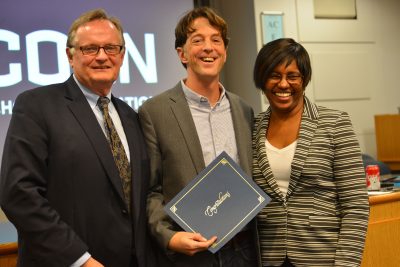
The Neag School named three 2017 research award recipients during its December faculty/staff meeting: Michael Coyne, 2017 Distinguished Scholar; Devin Kearns, 2017 Outstanding Early Career Scholar; and Charles D. T. Macaulay, 2017 Outstanding Student Researcher. Read more.
The Neag School Dean’s Fund stands among 2017’s top funds supported by Close to Home donors, according to the UConn Foundation.
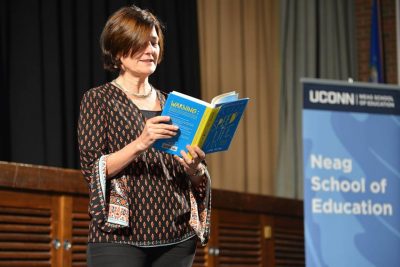
In conjunction with the Connecticut Children’s Book Fair in November, the Neag School hosted a schoolwide visit to Vernon Center Middle School in Vernon, Conn., featuring author Carol Weston, who wrote the Ava Wren and Speed of Life series. Check out photos from the event.
The UConn Collaboratory on School and Child Health (CSCH) partnered with co-sponsors Neag School and the UConn Foundation to host the first Science Salon of the 2018 series. The event, “How Schools Succeed by Nurturing the Whole Child,” took place in November at the Lyceum in Hartford, Conn. Read more and see photos from the event.
Department of Curriculum and Instruction (EDCI) and Teacher Education
Junior-year curriculum and Instruction students in elementary education gathered in November for the second annual Curriculum Conference, where they presented their work and interacted with peers. Check out photos from the event.
Department of Educational Leadership (EDLR)
The Center for Education Policy Analysis (CEPA) Speaker Series in November featured Kara S. Finnigan from the University of Rochester, who presented “The Politics of Regional Equity: Mobilizing Civic Capacity to Address Segregation.” In December, George Spencer from New York University spoke on “Promoting the Attainment-to-Transfer Pathway: Effects of Transfer Associate Degree Policies Across States.” Learn more about the CEPA Speaker Series here.

Numerous faculty members and graduate students from the Department of Educational Leadership presented at the 2017 UCEA Convention in November in Denver. Faculty presenters and facilitators included Aarti Bellara, Eric Bernstein, Laura Burton, Casey Cobb, Morgaen Donaldson, Shaun Dougherty, Michele Femc-Bagwell, Erica Fernández, Rachael Gabriel, Richard Gonzales, Kimberly LeChasseur, Jennie Weiner, and Sarah Woulfin; for more information, access the full UCEA Convention program here. Read about some of the student researcher presentations, which included those given by Jonathan Carter, Shannon Holder, Alexandra Lamb, Scott Hurwitz, and others.
First-year Higher Education and Student Affairs (HESA) students hosted a Gallery Walk in November on the UConn Storrs campus, culminating their experience in the Structured Group Dialogue in Student Affairs course. The course is designed to allow students the opportunity to explore relationship building, as well as differences and commonalities of experience; engage in dialogue around contentious issues; and share social responsibility within student affairs. See photos from the event.
Department of Educational Psychology (EPSY)
The Neag School’s measurement, evaluation, and assessment program was ranked No. 14 among the 20 best online master’s programs in educational assessment, measurement, and evaluation by Top Master’s in Education.
The Center for Behavioral Education and Research (CBER) hosted its December Breakfast Brown Bag series with a panel discussion titled “Conceptualizing and Studying Classroom and School Climate,” featuring Tamika La Salle, George Sugai, and Elizabeth Howard. In November, CBER also hosted “Enhancing Equity in School Discipline: Practical Strategies and Tools,” featuring Kent McIntosh from the University of Oregon, Charlene Russell-Tucker of the Connecticut State Department of Education, and Jennifer Freeman of the Neag School. The full-day session was co-sponsored by the Connecticut State Department of Education and the Connecticut School Climate Transformation Grant.
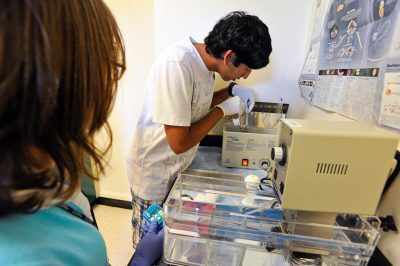
The Renzulli Center for Creativity, Gifted Education, and Talent Development was recently awarded $300,000 from the Jack Kent Cooke Foundation to provide a summer mentorship program in the summer of 2018. Read more.
UConn alum Howard Klebanoff, a friend and supporter of the Neag School and its Special Education Summit, was recognized with the Marquis Lifetime Achievement Award for his dedication as an attorney who represents families of children with disabilities.
Faculty/Staff
Ronald Beghetto published “Inviting Uncertainty into the Classroom” in the October issue of Educational Leadership. It was one of the top 10 articles published by Educational Leadership in 2017. Also in October, he served on a panel for the 50th anniversary of the Creativity Expert Exchange in Buffalo, N.Y. In November, he gave the keynote on “Unfreezing Creativity” at the Radboud Teachers Academy in the Netherlands.
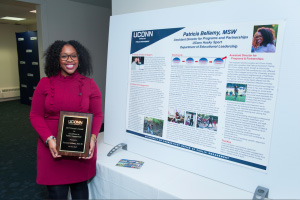
Patricia Bellamy, assistant director for programs and partnerships for Husky Sport, received the 2017 Provost’s Award for Excellence in Public Engagement in a full-time staff position.
Reginald Blockett took part in symposia and paper sessions at the 42nd Annual Association for the Study of Higher Education (ASHE) Conference in Houston in November.
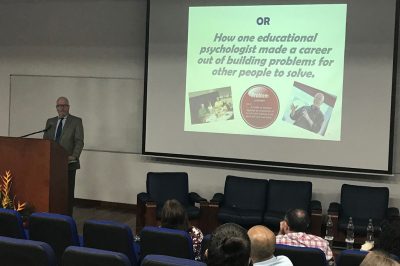
Scott Brown provided training on problem-based learning at the Universidad Javeriana in Colombia, as part of a two-week Fulbright Specialist Program.
Rebecca A. Campbell spoke on the importance of accurately recording home languages during school registration at the American Anthropological Association meeting in November in Washington, D.C.
Milagros Castillo-Montoya co-presented with doctoral student Joshua Abreu and alum Abdul Abad ’16 MA, in addition to giving other presentations, at the 42nd Annual Association for the Study of Higher Education (ASHE) Conference in Houston in November.
Todd Campbell co-presented with doctoral student Laura Rodriguez at a professional development day they led for Norwich Free Academy (NFA) science teachers at NFA in Norwich, Conn. The title of the workshop was “Next Generation Science Standards and Engineering” and is part of an extended partnership with NFA based on the STEM Academy work John Settlage initiated with the school. Campbell also presented, along with Neag School Rodriguez and another doctoral student, TJ McKenna, at the Connecticut Science Teachers Association meeting at the Connecticut Science Center in Hartford, Conn., in November.
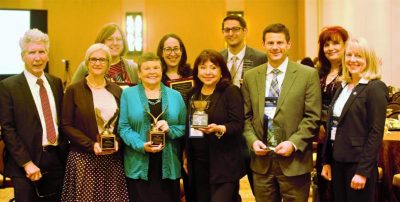
Casey Cobb was awarded the University Council for Educational Administration (UCEA)’s 2017 Hanne Mawhinney Distinguished Service Award, which was presented in November at the UCEA Convention in Denver. The award honors UCEA faculty for their outstanding service to the organization and to the field. Cobb was also elected to serve another three-year term on the Executive Committee for UCEA.
Joseph Cooper participated in UConn’s Day of Metanoia, hosting a discussion on “Racism at UConn and Beyond.” Read more.
Shaun Dougherty presented on his IES-funded research in career and technical education at New York University in November.
Justin Evanovich presented “Husky Sport as a Campus-Community Partnership Model” at the Campus Compact for Southern New England meeting at Quinnipiac University in Hamden, Conn., in November.
Adam Feinberg co-published “Examining the Influence of Interval Length on the Dependability of Observational Estimates” in volume 46 of the National Association of School Psychologists’ School Psychology Review.
Michele Femc-Bagwell co-published “Culturally Responsive Practice and the Role of School Administrators” in the October issue of Psychology in the Schools.
Erica Fernández published “Venimos Para Que se Oiga la Voz”: Activating Community Cultural Wealth as Parental Educational Leadership in the July issue of Educational Policy.
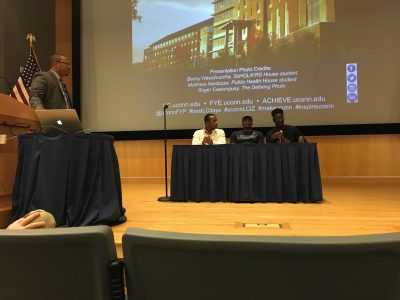
Erik Hines presented on education abroad and university partnerships at the “Breaking Barriers for Buckeyes Abroad: Inclusive Excellence” event at The Ohio University in October. He also presented on the ScHOLA2RS House and how school counselors and other educators support Black males in the PK-12 educational pipeline. For the UConn School Counselors Day, held in November, he was also a featured presenter. More than 200 school counselors from Connecticut, Massachusetts, and New York attended the daylong event at the Storrs campus.
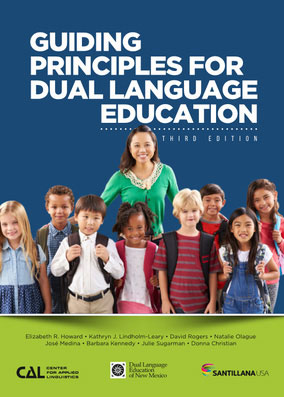
Elizabeth Howard is the lead author of the third edition of Guiding Principles for Dual Language Education (Center for Applied Linguistics, 2017), released in November. The volume is available to download for free. Guiding Principles has become the seminal guide for dual-language programs nationwide. Read more about the latest edition here.
Joshua Hyman published “Does Money Matter in the Long Run? Effects of School Spending on Educational Attainment” in the November issue of American Economic Journal: Economic Policy.
James Kaufman co-published, with Neag School graduate student Sarah Luria and another colleague, “Enhancing Equity in the Classroom by Teaching for Mathematical Creativity” for the September issue of the International Journal on Mathematics Education.
Dean Gladis Kersaint presented at the Florida Mathematics Leadership Summit in Orlando, Fla., in November.
Tamika La Salle presented at the 10th Annual Georgia Association for Positive Behavior Support (GAPBS) Conference in Duluth, Ga., in November. She also served as the keynote speaker at the Texas Equity Summit in December in Houston.
Kimberly LeChasseur, Morgaen Donaldson, Erica Fernández, and Michele Femc-Bagwell co-published “Brokering, Buffering, and the Rationalities of Principal Work” in the November issue of Journal of Educational Administration.
Catherine Little presented on her Project SPARK grant (Supporting and Promoting Advanced Readiness in Kids) at West Hartford (Conn.) Public Schools as part of a community member showcase in December. Read more about the exhibit.
Allison Lombardi co-published “Is College and Career Readiness Adequately Addressed in Annual and Postsecondary Goals?” in the December issue of Journal of Disability Policy Studies.
Betsy McCoach, Del Siegle, and E. Jean Gubbins, along with postdoctoral student Rashea Hamilton, co-published with other colleagues “Disentangling the Roles of Institutional and Individual Poverty in the Identification of Gifted Students” for the October issue of Gifted Child Quarterly.
Jennie McGarry was a panelist on the role of sport and physical activity at University of Pennsylvania’s Netter Center’s 25th Anniversary International Conference in Philadelphia in November. McGarry has been also named to a two-year position as consultant to the editor of the journal Sex Roles, serving as a qualitative methodologist. In November, she also presented a case study for the 2017 Harvard Graduate School of Education Management Development Program Post-Program Webinar.
Jennifer Michno and Richard Gonzales were awarded funding by the Hartford Foundation for Public Giving for a project focused on leadership training through UCAPP. Read more.
Glenn Mitoma served as co-chair of UConn’s Day of Metanoia, held in November. Read more.
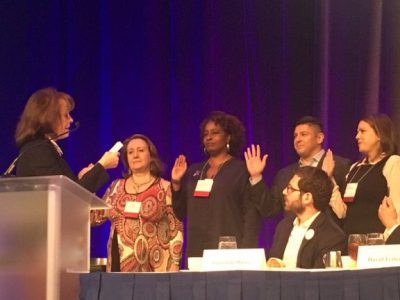
Bianca Montrosse-Moorhead was sworn in as a board member-at-large for the American Evaluation Association, and also presented, at the annual conference in Washington, D.C., in November. In December, she presented “A Primer on Evaluation Theories and Approaches” at the Conferencia Global De Evaluacion 2017 in Guanajuato, Mexico.
Sally Reis, Joseph Renzulli, and Deborah Burns ’87 Ph.D co-wrote Curriculum Compacting: A Guide to Differentiating Curriculum and Instruction Through Enrichment and Acceleration (Prufrock Press, 2nd ed.), which was awarded the inaugural National Association of Gifted Children (NAGC) Book of the Year Award.
Sally Reis and Joseph Renzulli co-presented at the National Association of Gifted Children’s national conference in Charlotte, N.C., in November.
Lisa Sanetti and Michele Femc-Bagwell are part of a team that won a seed grant competition, sponsored by the Collaboratory on School and Child Health (CSCH), for their project “Applying the Healthy Workplace Participatory Program to Address Teacher Wellbeing: A Mixed-Methods Pilot Study.”
Del Siegle published “Technology: The Dark Side of Technology” in Gifted Child Today.
George Sugai participated in the Education Working Group with the Moving Justice Forward Conference at Yale Law School in October at the Yale campus in New Haven, Conn. He also gave the keynote address at the 10th anniversary celebration of the Missouri Prevention Center, held at the University of Missouri in November.
Kari B. Taylor presented “Contextualizing How Undergraduate Students Develop Toward Critical Consciousness” at the 42nd Annual Association for the Study of Higher Education (ASHE) Conference in Houston in November.
Jaci VanHeest is part of a team that won a seed grant competition, sponsored by the Collaboratory on School and Child Health (CSCH), for a project titled “Gearing Up! Using Exergaming to Impact Health in Overweight Children.”
Jennie Weiner taught at the opening convening for the new Strategic Data Fellows (SDP) initiative at Harvard University’s Center for Education Policy Research (CEPR) in Boston in November. She also spoke to New York’s region superintendents on her and Laura Burton’s work on gender bias in educational leadership. Weiner also co-published with doctoral student Chelsea Connery ’13 (ED), ’14 MA “Direct Democracy’s Threat to Democratic Schools: Ron Unz and the Case of Bilingual Education” in the National Network for Education Renewal’s October 2017 Education in a Democracy edition.
Sarah Woulfin began her appointment as a UCEA Plenary Session Representative. Woulfin also co-published with graduate student Britney Jones “Rooted in Relationships: An Analysis of Dimensions of Social Capitol Enabling Instructional Coaching” for the recent issue of Journal of Professional Capitol and Community.
Students
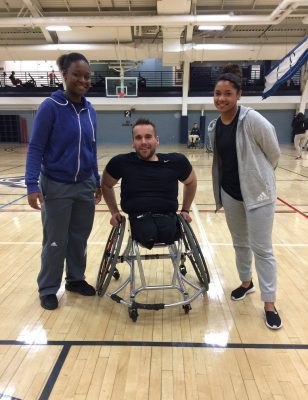
Husky Adapted Sport, a UConn student organization led by sport management undergraduate students Kenisha Lee and Nadeige Bailey, organized an Adapted Sport Wheelchair Basketball event in November on the UConn Storrs campus through a partnership with UConn Recreation and the Ryan Martin Foundation. View a photo album from the event.
Sport management graduate students hosted Shireen Ahmed, public speaker and sports activist, in November as part of the UConn Day of Metanoia, and doctoral student Michael Mallery interviewed her.
Nneka Arinza, a sport management doctoral student, presented “Initiating Dialogue Across Differences” at the Campus Compact for Southern New England at Quinnipiac University in Hamden, Conn., in November.
Pauline Batista, a first-year doctoral student in educational leadership, has been awarded a $1,900 El Instituto predoctoral award to support the production of a short documentary to be shot in Brazil entitled “A escola e a alma.”
Craig Creller, a student in the Executive Leadership Program, was appointed interim chief academic office of Norwalk (Conn.) Public Schools. Creller will serve in the role for the remainder of the 2017-18 academic year. He has served as the district’s K-12 mathematics instructional specialist for the past seven years.
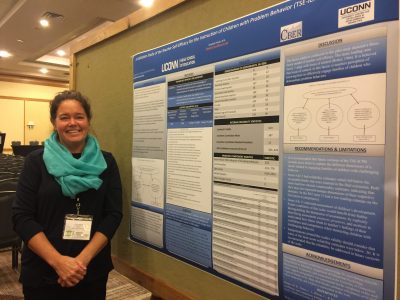
Elizabeth Howe, a doctoral student in educational psychology, won the 2017 Kaleidoscope Student Research Poster Award for Qualitative Research at the Teacher Education Division meeting for the Council for Exceptional Children in Savannah, Ga., in November. Mary Beth Bruder is her advisor.
Scott Hurwitz ’06 (CLAS), ’07 MA, a doctoral student in education leadership, received the School Superintendents Association (AASA) 2018 Educational Administrative Scholarship Award. He will be honored at the 2018 AASA National Conference on Education (NCE) in Nashville, Tenn., in February. He has also been chosen to participate with the 38th annual David L. Clark National Graduate Student Research Seminar in K-12 Educational Administration and Policy, held in conjunction with the AERA Annual Meeting in New York, N.Y., in April. Hurwitz serves as a mentor principal to a UCAPP intern as well.
Patricia Jahaly, a first-year doctoral student in the leadership and education policy program, has been appointed the new managing editor of Educational Administration Quarterly (EAQ), a journal hosted by the Neag School.
Nina Klein, a sport management undergraduate student, was a member of the UConn women’s field hockey national championship team.
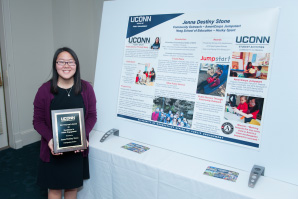
Jenna Stone, a senior elementary education major, received the 2017 Provost’s Award for Excellence in Public Engagement as an undergraduate student.
Alumni
Michael Alfano ’01 Ph.D. was appointed dean of the Farrington College of Education at Sacred Heart University in Fairfield, Conn. He was most recently the dean of the School of Education and Professional Studies at Central Connecticut State University.
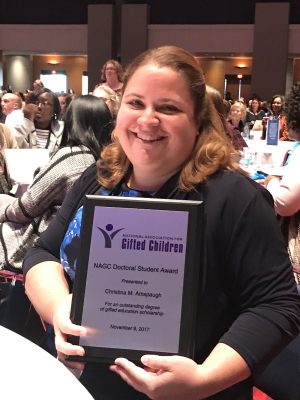
Christina Amspaugh ’06 MA, ’17 Ph.D. was recognized with the National Association for Gifted Children (NAGC) Doctoral Student Award at the organization’s annual conference in Charlotte, N.C., in November. The award is presented to doctoral students who have demonstrated exemplary work in research, publications, and educational service, as well as for their potential for future scholarship. She is currently an assistant professor at the University of Virginia.
Emily Armstrong ’16 (ED), ’17 MA, former UConn women’s soccer goalkeeper, signed with Icelandic soccer club IBV, Iceland’s top women’s soccer league, for the 2018 season.
Daniel Arndt ’15 (ED), ’16 MA organized a professional development/networking day in December with Todd Campbell that included a group of six other Neag School alum science teachers on the UConn Storrs campus.
In addition to being named the Neag School’s 2018 Outstanding Professional, Carol D. Birks ’08 ELP has been appointed superintendent of the New Haven (Conn.) Public Schools.
Robert R. Bonn ’74 (ED), Carthage College’s director of athletics, is retiring in June after a 25-plus year career at the college.
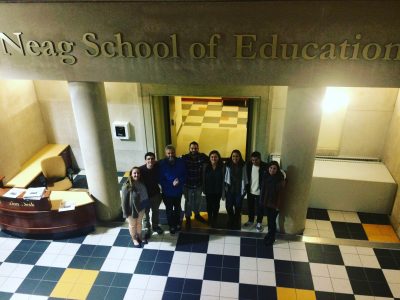
Bridget (Heston) Carnemolla ’13 Ed.D., ’14 ELP was appointed superintendent of Avon (Conn.) Public Schools. She currently serves as superintendent of Watertown (Conn.) Public Schools.
Patricia Charles ’90 6th Year retired as the superintendent of Middletown (Conn.) Public Schools after leading the district for five years.
Jeremy Crouse ’13 (ED), ’14 MA, Bob Janes ’12 (ED), ’13 MA, Carolyn Larson ’11 (ED), ’12 MA, Lauren Midgette ’12 (ED), ’13 MA, Garrett Schwab ’16 MA, and Kelly Soule ’12 (ED), ’13 MA presented as guest speakers for Richard Schwab’s Teacher Leadership course in November.
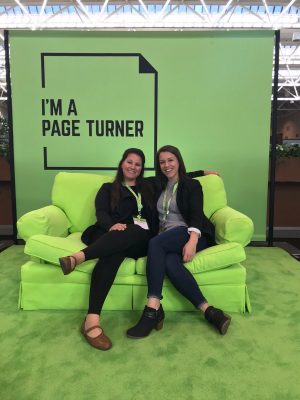
Anastasia DiFedele-Dutton ’04 (CLAS), ’08 MA, ’15 Ed.D. and Elizabeth Simison ’04 (CLAS), ’08 MA, ’17 Ed.D. presented at the National Council of Teachers of English Annual Conference in St. Louis in November.
Tessla Donovan ’15 (CLAS), ’17 MA presented at the National Council of Teachers of English Annual Conference in St. Louis in November.
R.J. Evans ’13 MA has been named assistant coach for the University of Louisville men’s basketball team. He was most recently an assistant coach at the University of Texas.
Kirk Ferentz ’78 (ED), head football coach of the University of Iowa, led the team to a historic Pinstripe Bowl win.
Lindsay Fallon ’09 MA, ’11 6th Year, ’13 Ph.D., an assistant professor of counseling and school psychology at UMass Boston, co-published “Direct Training to Increase Agreement Between Teachers’ and Observers’ Treatment Integrity Ratings” in Assessment for Effective Intervention with Lisa Sanetti, Sandra Chafouleas, Amy Briesch ’09 Ph.D., and others.
Susan D. Huard ’78 MA, ’83 Ph.D. was named interim president of Great Bay Community College in New Hampshire. She is currently president of Manchester (N.H.) Community College and will remain in that position, dividing her time between the two colleges.
David N. Kohn ’79 (ED), ’81 MA is serving as the girls’ basketball coach at Parish Hill High School in Norwich, Conn.
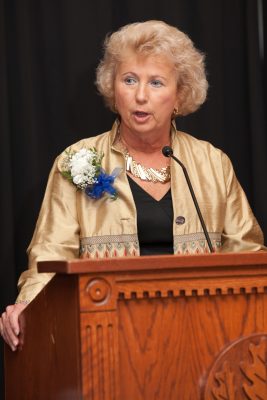
Fran P. Mainella ’69 (ED) was recognized with the Albert Nelson Marquis Lifetime Achievement Award by Marquis Who’s Who. President of Fran Mainella Consulting since 2014, and visiting scholar at Clemson University, Mainella had a 40-year park and recreation career culminating as director of the U.S. Department of Interior’s National Parks Service.
Joseph J. Masi ’99 (ED), ’00 MA, ’11 6th Year was selected by the Connecticut Association of Schools as the 2018 High School Assistant Principal of the Year. He is the assistant principal at Northwestern Regional High School in Winsted, Conn.
Karen Mullins ’79 (ED), ’80 MA was inducted into the National Fastpitch Association Hall of Fame after serving as UConn’s softball coach for 31 seasons (1983-2014), including eight trips to the NCAA tournament.
Jocelyn Poglitsch ’06 6th Year was named principal of Metacomet School in Bloomfield, Conn.
Violet Jiménez Sims ’02 (CLAS), ’05 MA, ’11 6th Year as been elected to the New Britain (Conn.) Board of Education. She is an assistant principal at the Montessori Magnet School in Hartford, Conn.

Len Tsantiris ’77 (ED) retired from UConn women’s soccer after 37 years serving as coach, raking up accomplishments including four national champion game appearances, seven Final Four appearances, and more than 500 wins.
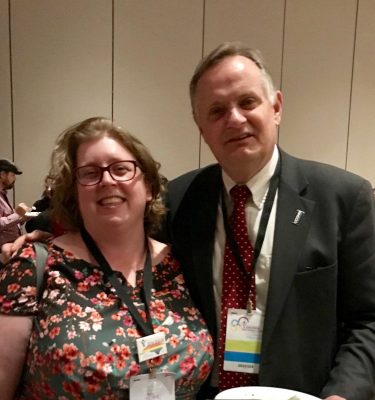
Hope Wilson ’09 Ph.D. received the 2017 Early Leader Award at the National Association for Gifted Children (NAGC) National Conference in Charlotte, N.C. in November. Wilson is an associate professor at the University of Florida and president-elect of the Florida Association for Gifted Children.
Jack Zamary ’85 (ED), ’88 MA has been named superintendent of Monroe (Conn.) Public Schools. He previously served as assistant superintendent for the same school district.
Anna Zamora ’16 MA is strength and conditioning coach for DePaul University’s women’s basketball program; fellow alum Jasmine Lister ’16 MA serves as assistant coach at DePaul.
In Memoriam
Stephanie R. Blecharczyk ’80
Waldemar L. Block Jr. ’50
Walter C. Burcroff ’58
Alan C. Davis ’74
William J. Demers Jr. ’70
John J. Dowd ’57
Victor F. Galgowski ’46
Edward F. Harrison ’61
Lawrence E. Jones ’50
Mary M. Keenan ’82
Ellen R. Kline ’78
Joseph T. Lombardo ’55
Maria A. Miranda ’70
George E. Membrino ’66
Maryellen Noonan ’96
Joseph P. Pannitto ’67
Ann S. Pickens ’80
Philip Pumerantz ’59
Melvin Rosenthal ’68
Kathleen M. Schrass ’81
Karen E. Simpson ’75
Sebastian J. Tarallo ’60
Sheila A. Tucker ’80
Alfred A. Viola Jr. ’58
Deborah L. Wood ’78
10 Questions With Ph.D. Students in Educational Leadership
In our recurring 10 Questions series, the Neag School catches up with students, alumni, faculty, and others throughout the year to offer a glimpse into their Neag School experience and their current career, research, or community activities.
Learning, Leadership, and Education Policy (LLEP) is a doctoral program available through the Neag School’s Department of Educational Leadership, offering concentrations in three areas: adult learning; leadership and education policy; and sport management. This installment of “10 Questions” connects with two current Ph.D. candidates in the LLEP program:
Shannon Holder of Hartford, Conn., is currently a doctoral student in the Neag School’s LLEP program with a concentration in leadership and education policy. She also is co-host of an education-focused podcast titled EduCulture. She completed her bachelor’s degree in history and master’s degree in teaching at Hampton University in Hampton, Va.
Jesse Mala ’14 MS, a native of New Britain, Conn., and a veteran of the U.S. Army, earned his bachelor’s degree in physical education from Central Connecticut State University and his master’s in exercise science from UConn. His concentration in the LLEP doctoral program is sport management.
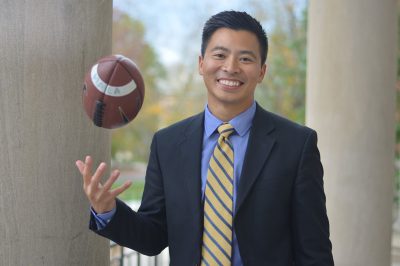
Where did your interest in your particular LLEP concentration originate, and how did you come to realize that you wanted to pursue a Ph.D. — and, ultimately, a career — in that field?
SH: I was a teacher for eight years, and I wanted to impact educational policy. I knew UConn had the leadership and education policy concentration, so I decided to apply. As a teacher, I felt that there were always new policies being implemented that didn’t seem like a match for the students I taught every day. It felt like no one was listening to teachers, and teachers were also being blamed for the problems in schools. Teachers around me were frustrated, and I wanted to do something to help them. At UConn, I’m constantly thinking about my former coworkers and reflecting on the frustration that they expressed to me. I also think about the past students I had and how I could change what they experienced in the classroom.
JM: I took a graduate course called sport-based youth development with [Professor Jennifer] McGarry, and throughout the whole course, the content just resonated with me. One aspect of the course examined how sport can be used as a tool to teach life skills among youth in poverty, which was basically my life experience. I enjoyed and believed in the concepts so much, I knew I had to get into this field.
How have your current and/or past experiences led you to where you are now?
SH: In the back of my mind, I always thought I could pursue a doctorate, but it took me a while to make the decision to leave the classroom. I was raised in Hartford, Conn., by my mother, a middle school music teacher in Hartford Public Schools. She instilled in me at an early age that education was extremely important. As a single mother, she made sure I was exposed to opportunities through school and my community; her master’s and bachelor’s degrees were from Howard University and New York University, and she was committed to making sure that I had similar opportunities to pursue my passions. I’ve always known that education was an American right, but as I moved through school, I also recognized that the quality of education was not the same for everyone.
When I was going into third grade, my mother transferred me to parochial school from my neighborhood public school. This early experience made me see the disparities in education at a very young age. I knew I was behind other students because I had to stay after school to practice skills my peers had learned in second grade. I also knew that my mom was paying tuition for me to attend my new school — a burden for her. This inspired me to pursue education and create a more equitable system where it doesn’t matter where you live or whether your parents can afford to send you to another school to get an excellent education.
JM: I grew up in the projects in New Britain, and for the first 15 years of my life lived in poverty. Yet in the midst of poverty, I found an outlet in sport. Participating in youth sports taught me basic life lessons and gave me the opportunity to practice these life skills. I feel like the foundations of perseverance, discipline, and resilience were laid while I was playing youth sports. These skills have helped me throughout my military and academic career. So when I found out there was a field of study that actually examines experiences of young persons in poverty playing sports and the benefits and skills that are transferred to other domains, I realized that this is what I wanted to study.
“I have learned a great deal about school leaders: both the challenges they face, and efforts to support them to make the changes we need.”
— Shannon Holder, LLEP Ph.D. Candidate
What is the focus of your dissertation research? What about this particular topic interests you?
SH: I’m currently working on my qualifying paper, which is a qualitative study of high school teachers that examines how they made sense of a detracking reform. I will continue studying detracking for my dissertation. I would like to do a case study of multiple schools that are detracked and study how it has impacted teachers, students, and the school community.
JM: My dissertation is examining the relationship of sport and physical activity participation on cognitive development and stress regulation among youth in poverty. I hope to grant insight into the cognitive and physiological benefits of sport and physical activity among youth in poverty, hopefully making a case that sport and physical activity can act as a buffer to the negative effects of stress on the brain. This topic interests me because this basically examines my experiences as a child who grew up in poverty and participated in sports and physical activity. I will be defending my dissertation in the late spring of 2018.
What are your future career goals? How do you envision your Ph.D. in LLEP helping you to meet those goals?
SH: After graduating, I want to be a professor at a research institution. The LLEP faculty have helped develop my research and writing skills. Jennie Weiner, [assistant professor and] my advisor, has exposed me to many opportunities so that I am prepared for the professorship.
JM: I would like to be a professor at a research university, where I would be able to do more research along my research interests. The classes, faculty and specifically my advisor in the LLEP program have helped me tremendously with training me how to think write and have provided me with the tools to be a successful scholar in my field.
What have you found most valuable about your experience in the Neag School’s LLEP doctoral program?
SH: I have learned more about how we are more segregated than we were in the 1960s. Even in areas where there is desegregation, racialized tracking within schools maintains the segregation status quo, perhaps more covertly. I have also learned a great deal about school leaders: both the challenges they face, and efforts to support them to make the changes we need.
JM: My most valuable experience would be learning how to be a scholar with my advisor, and the relationships built with my fellow Ph.D. students.
“I feel like the foundations of perseverance, discipline, and resilience were laid while I was playing youth sports. … When I found out there was a field of study that actually examines experiences of young persons in poverty playing sports and the benefits and skills that are transferred to other domains, I realized that this is what I wanted to study.”
— Jesse Mala, LLEP Ph.D. Candidate
How has your perspective changed over the course of your time in the LLEP doctoral program, or what important lessons have you learned?
SH: I left the classroom with a very narrow view of policy research. I have a better understanding of how policy is made and then implemented in schools.
JM: I feel like each class helped me expand my knowledge as a scholar and pushed me to practice different skills as a future scholar. A very important lesson that I’ve learned is that all social/biological phenomena is so complex. A simple explanation to a complex issue just reveals a limited understanding of the phenomena of interest. My work as a scholar addresses a very small piece of very complex issue.
How would you define an effective leader?
JM: An effective leader is one who cares, empowers, and is a living example of the principles they teach.
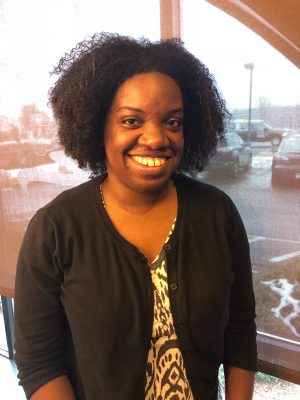
Who has been your greatest mentor? What kind of support or insight have they provided to you along the way?
SH: Jennie Weiner my advisor has been my best mentor. She has been the greatest support and motivator to me at the University of Connecticut. As my advisor, she makes sure that I’m on track with my coursework and I’m developing as a scholar. She frequently treats me as an equal and pushes me to apply for opportunities at UConn and beyond. This past year she helped me apply for a grant and a leadership opportunity and I received both. If I had not had Jennie’s support, neither of these opportunities would have occurred.
What is one thing that most people perhaps don’t know about you, but that you believe gives you a unique or valuable perspective?
SH: I love futuristic science fiction books and movies. I think my love of sci-fi helps me to always have in the back of my mind that innovation and change are possible even though the world can feel overwhelming and negative sometimes.
JM: Upon meeting me, you probably wouldn’t guess that I spent the first 15 years of my life in urban poverty. I believe this experience gives me a valuable perspective as a scholar who is examining issues among youth in poverty.
Why did you choose the Neag School for your doctoral program?
SH: Wherever you go in the U.S., children of color lag behind their peers in most academic areas and access to a quality education. Of course, creating access to quality education for urban students is a thorny problem that eludes simple, quick solutions. And the current emphasis on fast results does not encourage the kind of deep-rooted reform our schools and communities need. In fact, it is reinforcing historical trends, and children of color suffer and are receiving an inferior education. I’ve seen this firsthand as Hartford students are grade levels behind their suburban peers. UConn was doing research on these inequalities, which is why I wanted to be a student here.
JM: My advisor, Jennifer McGarry, studies sport-based youth development, which is my passion.
What advice would you give to those who may be interested in pursuing a Ph.D. through the Neag School’s LLEP doctoral program?
SH: It’s a great program, and it’s good to brainstorm some topics you would be interested in studying prior to starting the program. Education is a large field, so it’s a good idea to know what you would like to focus on.
JM: If you have the opportunity, do it! Talking to other doctoral students on campus and from other universities, I believe that my experience here at UConn in the LLEP doctoral program is very special and unique. I have felt so supported by my advisor both academically and personally to be the scholar and person that I envision myself to be. Also, experiencing this program with such a racially and experientially diverse group of students has been awesome. When I graduate this spring, I will miss my Neag School LLEP family.
Learn more about the LLEP program at llep.education.uconn.edu. Read other installments of the Neag School’s 10 Questions series.
Former Clown Kohn Now Coaching at Parish Hill
The Bulletin (Neag School alumnus David Kohn is profiled about his experiences as a professional clown and coach)
Trying to Teach Love in a World of Hate
Hartford Courant (Neag School master’s student publishes op-ed about her experiences in the classroom)
Boon Authors Carthage Success Story
The Journal Times (Neag School alumnus Bob Bonn is profiled about his 25-year history as athletic director of Carthage College)
Iowa’s Late Score Sparks Pinstripe Bowl Victory
Land of 10 (Alum Kirk Ferentz, head football coach of University of Iowa, led the team to a historic Pinstripe Bowl win)
106 Experts Share Their Thoughts on the Future of Education
The Edvocate (Professor Preston Green weighs in on the future of charter schools and school choice)
